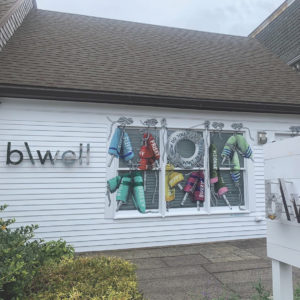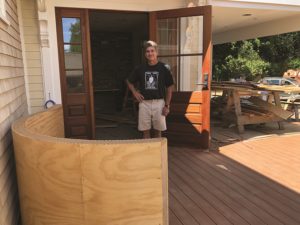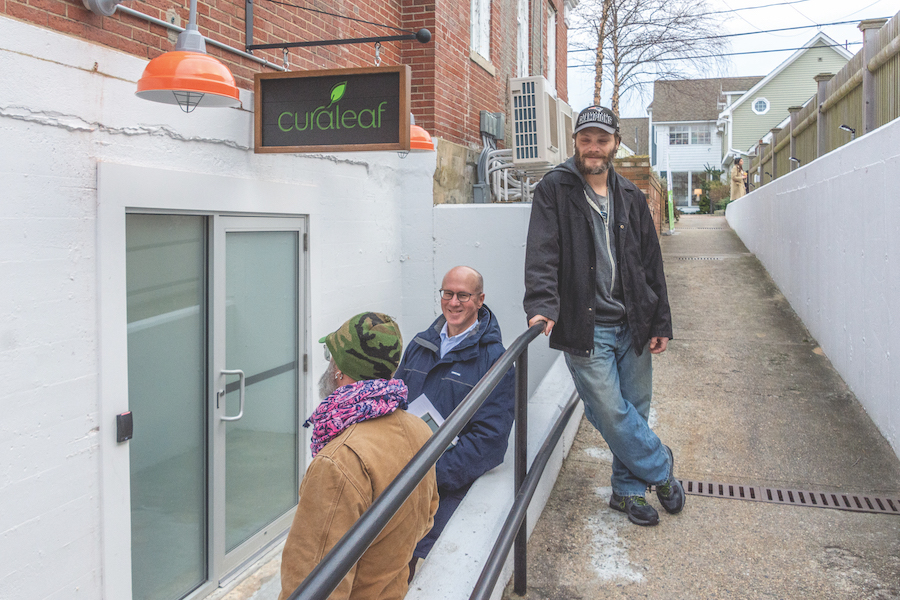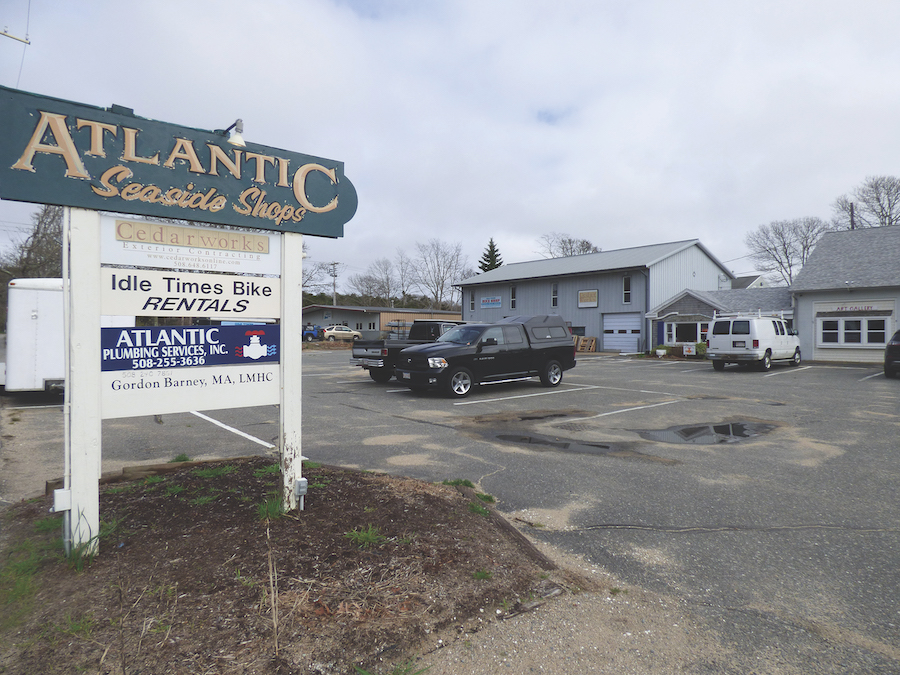PROVINCETOWN — When b\well opened here on Friday, Sept. 4, it became the second recreational (or “adult-use”) marijuana dispensary on Cape Cod. Nine more dispensaries are on a path to opening on the Outer Cape. They could be a boon to town finances, but it is still unclear whether the industry — so far dominated by larger players — will benefit local entrepreneurs.
Local ownership is rare, so far, because of the difficulty of obtaining capital for marijuana businesses. Because marijuana has not been legalized at the federal level, borrowing from federally insured banks for any kind of pot business is not an option. It’s not even possible to get a mortgage for the property involved. Having to buy everything with cash up front is a bigger barrier to entry than any regulatory hurdle, said Karen Nash, an owner of b\well.

Nash said her business is being financed by “90 percent Provincetown investors, meaning they live here year-round, are business owners here, or have second homes here.”
Nash lives in Provincetown. Only one of her investors, Judy Mencher, is listed on b\well’s provisional license. Mencher has a home in Provincetown.
Curaleaf is the other adult-use dispensary on the Cape, and it stands a few blocks away from b\well. The Curaleaf chain has 90 dispensaries and operates in 23 states. The cash to develop that business has not come from local investors. According to the New York Times, Curaleaf “is led by one of Russia’s most influential financiers, and backed by another.”
Almost every business that is pursuing a retail license to sell pot on the Outer Cape is also pursuing either a cultivation license or a production license, or both.
There are two reasons to vertically integrate like this, said Nash: the margins in retail are thin, and the supply is still unsteady.
“The supply side has been coming online more slowly than the retail side,” said Nash. “Prices have fluctuated — the wholesale price is up to $4,100 a pound right now in Massachusetts. In Oregon, there’s an oversupply, and the price has crashed to $900 a pound.”
Pot can’t be sold across state lines, so each state is essentially setting up a separate industry with separate supply chains.
“Even in a mature market, it’s going to be more like a restaurant — the sales numbers are large, but the profit margins are relatively small,” Nash said. Almost every operator is trying to be vertically integrated in order to build a better profit structure.
Going Vertical
Cultivation licenses allow for up to 100,000 square feet of marijuana plants, either outdoors or indoors; production licenses allow for the conversion of raw marijuana flower into edible foods and concentrates. Developing a retail operation and one or both of these other businesses at the same time magnifies the complexity, the time involved, and the up-front costs of getting underway.
Curaleaf has retail, cultivation, and production operations in Massachusetts. B\well has a retail license and is pursuing a production license. Almost all of the other retail applicants on the Outer Cape are also pursuing cultivation licenses, although in nearly every case that cultivation would take place off Cape. Salty Farmers of Eastham is the exception; if approved, its cultivation operation would be in Eastham.
The High Dune Craft Cooperative in Truro recently submitted applications to the Cannabis Control Commission for a specialty cultivation license. David DeWitt, a farmer in the co-op, said what they’re pursuing is a “social equity license.” DeWitt, who also works for b\well and has worked for Curaleaf, said such licenses “are meant to create a way into the business for people who might not have millions and millions in cash.
“My old business partner Tim McCarthy worked with Sheila Lyons and [state Sen.] Julian Cyr to figure out how outdoor farmers could get back in this,” said DeWitt. He credited both Cyr and state Rep. Sarah Peake with helping pass the legislation to create these new kinds of licenses. (Lyons was a county commissioner, and is running for the office again.)
A craft marijuana cooperative can include multiple outdoor farms, indoor farms, and production operations. The High Dune Co-op currently consists of four farmers in Truro: DeWitt, Peter Staaterman, Deb McCullough, and Stephanie Rein, who is a member of the Truro Select Board.
When it comes to cultivation, “All there is right now is the big guys,” said DeWitt. “It has to do with the transition from the medical-use rules into the new adult-use rules. Early on, they only let people who had already applied for medical licenses apply for adult-use. They gave them a six-month head start. And in order to do medical, you had to be fully vertically integrated: grow, process, manufacture, package, sell, all under one roof. It favored huge players at the outset. You had to have a half-million in the bank or they wouldn’t even look at your application.”
The Cannabis Control Commission and the state government are trying to reshape that market now. Nash said she believes the CCC wants the market to be more diverse.
Tax Revenue
Regardless of the composition of the businesses, tax dollars are expected to benefit towns where they are located. First, all marijuana license holders are obligated to negotiate host community agreements with the towns they are in. In the case of retail licenses, towns are allowed to ask for 3 percent of revenues as a community impact fee, to be used to mitigate any problems arising from the industry (examples include traffic, congestion, policing, fire, or other needs). This is in addition to the 3 percent of revenue that is collected by the state and returned to towns through the local option tax.
Six percent of retail revenue could wind up being a lot of money.
Curaleaf opened on Feb. 6, 2020, and had to close on March 24 as part of the statewide coronavirus shutdown. It opened again on May 25. That means Curaleaf was open for seven weeks in the first quarter of 2020, and for five weeks in the second quarter.
The tax revenue to Provincetown from those seven weeks of sales in the first quarter was $53,500, according to Assistant Town Manager David Gardner. That reflects about $127,000 a week in gross sales for those seven weeks.
Early returns show that the tax revenue from the five weeks of the second quarter that Curaleaf was open will be about $54,000. At 6 percent of gross revenue, that means Curaleaf was selling about $180,000 of product a week in those five weeks.
Based on the earlier, lower sales figures, a full 13-week quarter could represent $100,000 in revenue to the town. At the higher sales number, it could be $140,000 per quarter.
Editor’s note: The print version of this article erroneously stated that b\well was pursuing a cultivation license; in fact, it is pursuing a production, not cultivation, license.



